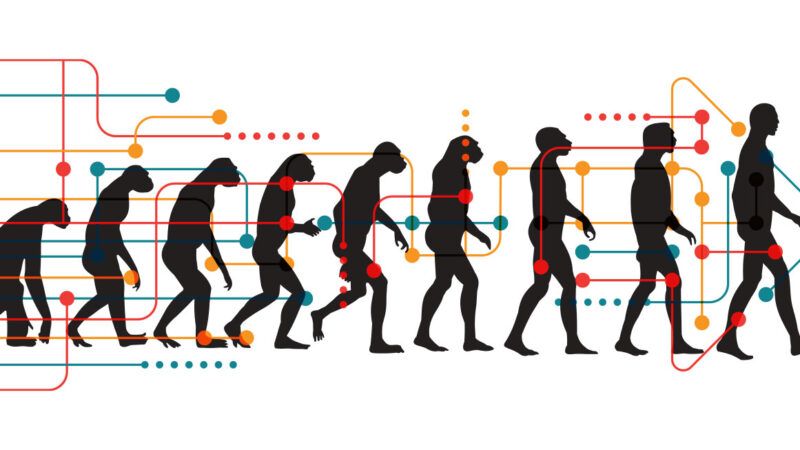Did Evolution Give Us Free Will?
Author Kevin J. Mitchell makes a neuroscientific case against determinism.

Free Agents: How Evolution Gave Us Free Will, by Kevin J. Mitchell, Princeton University Press, 352 pages, $29.95
What is free will? Can a being whose brain is made up of physical stuff actually make undetermined choices?
In Free Agents: How Evolution Gave Us Free Will, the Trinity College Dublin neuroscientist Kevin J. Mitchell argues that evolution has shaped living creatures such that we can push back when the physical world impinges upon us. The motions of nonliving things—air, rocks, planets, stars—are entirely governed by physical forces; they move where they are pushed. Our ability to push back, Mitchell argues, allows increasingly complex creatures to function as agents that can make real choices, not "choices" that are predetermined by the flux of atoms.
How can that be? After all, just like air and rocks, bacteria and sharks and aardvarks and people are made of physical stuff. Determinism holds that, per the causal laws of nature, the unfolding of the universe is inexorable and unbranching, such that it can have only one past and one future. Human beings do not escape the laws of nature, so any and all of our "choices" have been predetermined from the beginning of the universe.
This view poses a moral problem: How can people be held accountable for their actions if they had no choice but to behave the way they did?
Some determinist philosophers, known as compatibilists, hold that causal determinism is compatible with free will. Daniel Dennett, for example, argues that you are exercising your free will if, in the absence of external coercion, you are acting in accordance with your desires. As the 19th century philosopher Arthur Schopenhauer put it, "Man can do what he wills but he cannot will what he wills."
Mitchell is unconvinced. "I cannot escape feeling that some sleight of hand is part of this argument," he writes. "The primary problem has been circumvented or even denied, rather than confronted. We start on the terrain of particle physics but shift to arguments at the level of human psychology, all aimed not at whether organisms can choose their actions but at the different question of whether we can ascribe moral responsibility."
***
Determinists argue that all causes come from the bottom up. They say the interactions of particles and forces are "causally comprehensive," ultimately accounting for everything that happens in the realm of weather, rocks, amoebas, planets, and brains.
Against that view, physicist Roger Penrose and anesthesiologist Stuart Hameroff suggest the locus of free will can be situated in the randomness of quantum mechanics. Many philosophers say this argument does not work, since random quantum wave fluctuations decohere into particles that then grind deterministically on in accordance with the laws of classical physics.
Physicists Nicolas Gisin and Flavio Del Santo have offered a controversial challenge to fully causal determinism, arguing against the assumption of infinite precision in the measurement of classical physical systems. They contend it is impossible to cram an infinite amount of information into a finite space, that the state of any physical system is therefore indefinite, and that indeterminacy is thus not confined to the quantum realm.
Barbara Drossel, a theoretical physicist at the Technical University of Darmstadt, takes a similar position. "While physics underlies everything that happens in nature, it does not determine everything," she writes. "Physics is not causally closed and does not encompass everything that happens in our world."
Mitchell builds on those arguments, suggesting that indeterminacy is resolved as physical systems interact over time; the past becomes fixed while the future remains open. The future, he writes, is characterized "by indefiniteness at both the quantum and classical levels," and the present is "the time during which this indefiniteness becomes definite." Mitchell's aim is to trace how living organisms, from microbes to humans, evolved into agents able to make choices that resolve the universe's inherent indeterminacy.
Organisms, Mitchell says, are patterns of processes that detect and react to internal and external stimuli as they seek to persist. As a microbe actively explores its environment, impinging molecules are processed internally as information about sustenance or danger, thereby providing the organism as a whole with "reasons" to initiate approach or avoidance. "In reality," he explains, "these organisms integrate multiple signals at once, along with information about their current state and its recent history, to produce a genuinely holistic response that cannot be deconstructed into isolated parts."
If microorganisms can act as agents, then much more complex organisms, such as humans, must have an even greater scope for agency in the world. Mitchell describes the structure of human brains in great detail, showing how patterns of neurons instantiate meaning as they respond to sensory stimuli and to each other. Thus emerges top-down causation—what happens when patterns at a higher hierarchical level exert causal influence over a lower level by changing the context within which the lower-level actions take place.
"The choices the organism makes based on parameters set at high level filter down," Mitchell writes, "to change the criteria at lower levels, thereby allowing the organism to adapt to current circumstances, execute current plans, and achieve current goals. In this way, abstract entities like thoughts and beliefs and desires can have causal influence in a physical system."
***
To be clear, Mitchell does not believe our choices are absolutely free from any prior causes. We are all constrained by our genes, our histories, our psychological traits, and our developed characters. Instead of radical metaphysical freedom, Mitchell persuasively develops a more modest conception of free will that entails the evolved ability to make real choices in the service of our goals—that is, to act for our own reasons.
This carefully argued, information-dense book will put a dent in any intellectual predilection toward determinism that some readers may have. It certainly did mine. But perhaps it was inevitable that it would do so.


Show Comments (129)